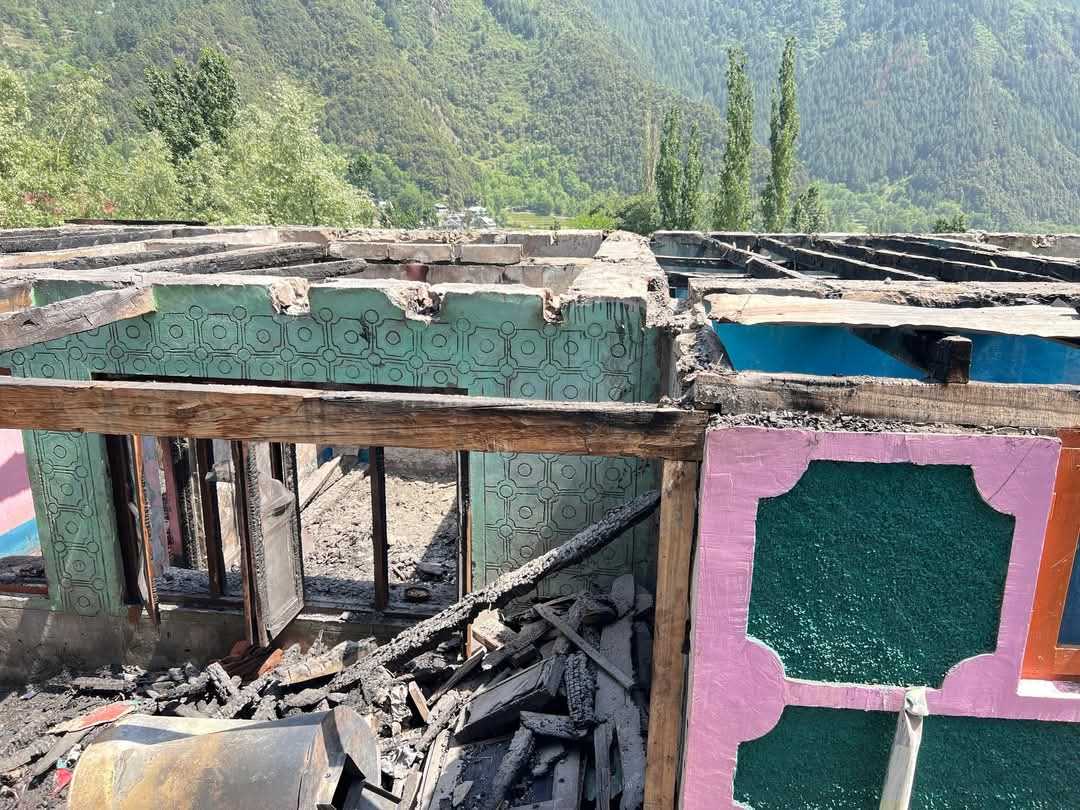
In the aftermath of Operation Sindoor, the Union Government has sanctioned an additional ₹25 crore for the reconstruction of 2,060 houses damaged due to relentless cross-border shelling along the Line of Control (LoC) in Karnah and adjoining areas. While the announcement brings a ray of hope, the ground reality paints a grimmer picture—families continue to live under open skies, exposed to the harsh extremes of nature.
In villages of Karnah some families are surviving without a roof over their heads. Children sleep under makeshift tents or tarpaulins, battling scorching temperatures during the day and mosquito-infested nights. The psychological trauma of living in a conflict zone is further deepened by the absence of basic shelter.
And as the community braces for bone-chilling winters beyond October, the fear of hypothermia, illness, and displacement hangs heavy. “If the sun doesn’t scorch us, the snow will bury us,” says Nazid Ahmad Mir, a local whose daughter was about to get married the day shelling startee, his house was flattened in the shelling. “ I lost everything, I lost all my savings and everything that I kept for my daughter's wedding. We have no solid walls, no roof. Only promises.”
The sanctioned ₹25 crore sounds significant, but residents and local leaders question its timely disbursement and adequacy. Victims report lengthy paperwork, verification delays, and bureaucratic hurdles that keep aid trapped in official files rather than reaching affected families.
“It’s a cruel irony,” says a social activists, Raja Waqar. “Relief must be swift in disasters, not buried under forms and files. Children here don't need files—they need food, clothes, and homes.”
High-ranking ministers and administrative officials have indeed visited the affected villages, documented losses, and assured help. However, ground reports confirm no immediate action has followed. “They came, clicked photos, left,” says Tahir Zaman. “What we need is cement, not ceremonies.”
Activists and civil society groups are calling for, Emergency shelters for families before monsoon and winters. Fast-tracked financial aid directly to victims’ accounts. Health camps and trauma support for children and elderly. Transparency in fund allocation and usage
The resilience of Karnah’s people is undeniable—but resilience cannot be the policy substitute for swift, empathetic governance.
As one local child put it, drawing a picture on the dusty floor of a tent:
"I drew my house... because I don’t have one anymore."
If our borderlands are our frontlines, then those who live there must be treated like the nation’s first priority—not its last. Immediate action, not delayed compensation, will define the nation’s respect for its most vulnerable patriots.
In the aftermath of Operation Sindoor, the Union Government has sanctioned an additional ₹25 crore for the reconstruction of 2,060 houses damaged due to relentless cross-border shelling along the Line of Control (LoC) in Karnah and adjoining areas. While the announcement brings a ray of hope, the ground reality paints a grimmer picture—families continue to live under open skies, exposed to the harsh extremes of nature.
In villages of Karnah some families are surviving without a roof over their heads. Children sleep under makeshift tents or tarpaulins, battling scorching temperatures during the day and mosquito-infested nights. The psychological trauma of living in a conflict zone is further deepened by the absence of basic shelter.
And as the community braces for bone-chilling winters beyond October, the fear of hypothermia, illness, and displacement hangs heavy. “If the sun doesn’t scorch us, the snow will bury us,” says Nazid Ahmad Mir, a local whose daughter was about to get married the day shelling startee, his house was flattened in the shelling. “ I lost everything, I lost all my savings and everything that I kept for my daughter's wedding. We have no solid walls, no roof. Only promises.”
The sanctioned ₹25 crore sounds significant, but residents and local leaders question its timely disbursement and adequacy. Victims report lengthy paperwork, verification delays, and bureaucratic hurdles that keep aid trapped in official files rather than reaching affected families.
“It’s a cruel irony,” says a social activists, Raja Waqar. “Relief must be swift in disasters, not buried under forms and files. Children here don't need files—they need food, clothes, and homes.”
High-ranking ministers and administrative officials have indeed visited the affected villages, documented losses, and assured help. However, ground reports confirm no immediate action has followed. “They came, clicked photos, left,” says Tahir Zaman. “What we need is cement, not ceremonies.”
Activists and civil society groups are calling for, Emergency shelters for families before monsoon and winters. Fast-tracked financial aid directly to victims’ accounts. Health camps and trauma support for children and elderly. Transparency in fund allocation and usage
The resilience of Karnah’s people is undeniable—but resilience cannot be the policy substitute for swift, empathetic governance.
As one local child put it, drawing a picture on the dusty floor of a tent:
"I drew my house... because I don’t have one anymore."
If our borderlands are our frontlines, then those who live there must be treated like the nation’s first priority—not its last. Immediate action, not delayed compensation, will define the nation’s respect for its most vulnerable patriots.
© Copyright 2023 brighterkashmir.com All Rights Reserved. Quantum Technologies